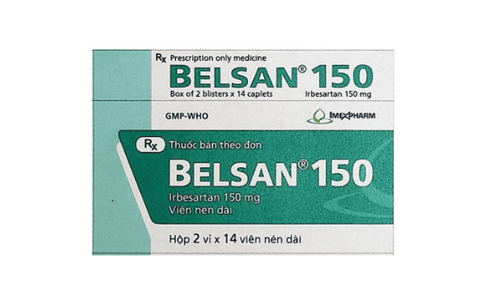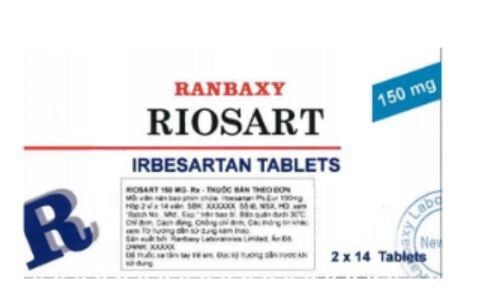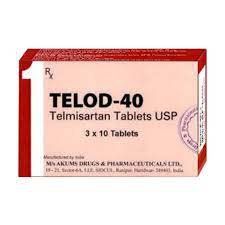This is an automatically translated article.
Combination of drugs in the treatment of hypertension is recommended by many experts. The most common is the combination of an ACE inhibitor/angiotensin receptor blocker with a thiazide diuretic such as the product Irbeazid AM. So what is Irbeazid AM and how is it used?
1. What is Irbeazid AM?
Irbeazid AM includes 2 active ingredients: Irbesartan 150mg and Hydrochlorothiazide 12.5mg. In particular,
Irbesartan is an active ingredient that blocks the AT1 receptor of angiotensin II, thereby blocking the entire effect of Angiotensin II mediated by the AT1 receptor. The effect of Irbesartan is to increase plasma renin and Angiotensin II concentrations, on the contrary, to decrease blood levels of aldosterone. The remaining ingredient of Irbeazid AM is Hydrochlorothiazide, which is a thiazide diuretic. Hydrochlorothiazide has a hypotensive effect, the primary mechanism of which is probably a decrease in plasma volume and extracellular fluid through sodium diuresis. Thereafter, the hypotensive effect of hydrochlorothiazide depends on the degree of reduction in peripheral resistance, through gradual adaptation of blood vessels to a decrease in sodium ion concentration. Therefore, the antihypertensive effect of Hydrochlorothiazide appears slowly after 1-2 weeks, while the diuretic effect occurs rapidly, possibly as soon as a few hours.
2. Indications of the drug Irbeazid AM
Irbeazid AM is indicated for the treatment of primary hypertension in patients with inadequate blood pressure control with irbesartan or hydrochlorothiazide monotherapy.
Irbeazid AM is contraindicated in the following cases:
Hypersensitivity to Irbesartan, Hydrochlorothiazide or any component of Irbeazid AM; Hypersensitivity to sulfonamide derivatives (because hydrochlorothiazide is a sulfonamide derivative); Pregnant and lactating patients are contraindicated to use Irbeazid AM; Some contraindications of Irbeazid AM related to the active ingredient hydrochlorothiazide:
Severe renal impairment (creatinine clearance less than 30ml/min); Hypokalemia or hypercalcemia; Severe liver failure, biliary cirrhosis and cholestasis. Contraindicated for pregnant and lactating women
3. Dosage and how to use Irbeazid AM
Patients take Irbeazid AM only once a day, with or without food. Dosage of Irbeazid AM is adjusted according to the dose of the individual components (Irbesartan and Hydrochlorothiazide).
Irbesartan/Hydrochlorothiazide 300mg/25mg can be used in patients whose blood pressure is not controlled by Irbesartan 300mg or Irbeazid AM monotherapy. Higher doses of Irbesartan/Hydrochlorothiazide 300/25 mg once daily are not recommended.
4. Side effects of Irbeazid AM
4.1. Side effects of Irbesartan Common side effects of the Irbesartan component of Irbeazid AM:
Dizziness, headache and orthostatic hypotension related to dose; Low blood pressure, especially in people with hypovolemia; Renal failure and severe hypotension in the presence of bilateral renal artery stenosis. Uncommon side effects of Irbesartan: Skin rash, urticaria, pruritus, angioedema; Increase liver enzymes; Hyperkalemia; Muscle pain, joint pain.
4.2. Hydrochlorothiazide Hydrochlorothiazide Hydrochlorothiazide in Irbeazid AM can cause excessive loss of potassium. This side effect is dose dependent and may be limited when patients take low doses (12.5 mg/day).
Some common side effects of Hydrochlorothiazide:
Fatigue, dizziness, headache, dizziness; Decreased blood potassium; Hyperuricemia; Increased blood glucose; Hyperlipidemia (when taking high doses)
5. Interactions of drugs Irbeazid AM
The combination of Irbeazid AM with other antihypertensive agents may increase the antihypertensive effect. Irbeazid AM when used at therapeutic doses can be safely combined with other antihypertensive agents, including beta-blockers, calcium channel blockers. Combination of Irbeazid AM with drugs that affect blood potassium: The potassium-losing effect of Hydrochlorothiazide is reduced by the potassium-sparing effect of irbesartan. However, this effect of Hydrochlorothiazide is likely to occur when Irbeazid AM is combined with other drugs that cause potassium loss, such as potassium-sparing diuretics, laxatives, Amphotericin, penicillin G sodium, salicylic acid derivatives. .. Irbeazid AM in combination with drugs affected by serum potassium disturbances: Periodic monitoring of serum potassium levels is recommended when Irbeazid AM is co-administered with drugs affected by dyskalemia (eg. digitalis glycosides or antiarrhythmic drugs). Lithium: Increased serum lithium concentrations and reversible toxicity have been reported in combination with ACE inhibitors. In addition, renal clearance of lithium is reduced by thiazide diuretics, leading to an increased risk of toxicity. Therefore, caution should be exercised when lithium and Irbeazid AM are co-administered, and serum lithium levels should be carefully monitored periodically. Irbesartan Drug Interactions: The pharmacokinetics of Digoxin were unchanged when co-administered with Irbesartan at a dose of 150 mg in healthy subjects, therefore Digoxin can be used concomitantly with Irbeazid AM.
Hydrochlorothiazide drug interactions:
Alcohol, barbiturates or narcotic tranquilizers increase the orthostatic hypotensive potential of Hydrochlorothiazide; Antidiabetic drugs (including oral drugs and insulin): Dosage adjustment is required when Irbeazid AM is used concurrently because Hydrochlorothiazide causes hyperglycaemia; Corticosteroids, ACTH: Increases electrolyte loss, especially hypokalemia, which may exacerbate the hypokalaemic effect of Hydrochlorothiazide; Muscle relaxants (eg, tubocurarine): Hydrochlorothiazide may increase the response to muscle relaxants; Non-Steroidal Anti-Inflammatory Drugs: May reduce the diuretic, natriuretic and antihypertensive effects of hydrochlorothiazide in some patients. Therefore, if used with Irbeazid AM, it is necessary to monitor to see if the desired diuretic effect is achieved; Quinidine in combination with Hydrochlorothiazide increases the risk of torsades de pointes, ventricular fibrillation and death; Hydrochlorothiazide reduces the effect of anticoagulants or gout medications; Cholestyramine or colestipol resins have the potential to bind to thiazide diuretics, leading to reduced gastrointestinal absorption of Irbeazid AM.
6. What precautions should be taken while using Irbeazid AM?
Caution when using active ingredient Irbesartan:
Decrease in blood volume: lead to symptomatic hypotension, especially after taking the first dose of Irbeazid AM. In patients with hypovolemia such as salt and water loss due to strong diuretics, salt restriction, diarrhea or vomiting, these conditions should be corrected prior to initiating therapy with Irbesartan or Irbeazid AM; Renal artery stenosis: increased risk of severe hypotension and renal failure when patients with bilateral renal artery stenosis or arterial stenosis of a single functional kidney are treated with drugs that affect the renin-angiotensin system. -aldosterone as the drug Irbeazid AM; Renal failure and kidney transplantation: When using Irbesartan for patients with renal failure, it is necessary to regularly check serum potassium and creatinine levels; Hyperkalemia: Hyperkalemia may be encountered when taking Irbesartan, especially in patients with poor cardiac and renal function, need to regularly check potassium levels, avoid concomitant use of Irbesartan with potassium-sparing diuretics. ; Mitral and aortic stenosis, hypertrophic obstructive cardiomyopathy: Particular caution should be exercised when Irbeazid AM is used in these patients; Primary hyperaldosteronism: Irbesartan is not recommended in this population. Caution when using Hydrochlorothiazide:
Due to the composition of Irbeazid AM with hydrochlorothiazide, patients must periodically monitor serum electrolytes and urine, especially in patients taking corticosteroids, ACTH or digitalis, quinidine. Severe renal impairment: may cause uremia, which may further impair renal function; Liver failure: Easy to lead to hepatic coma; Gout: Irbeazid AM can make the disease worse. Diabetes: pay attention to adjust specific drugs. Caution should be exercised when driving or operating machinery while taking Irbeazid AM as dizziness and fatigue may occur.
Please dial HOTLINE for more information or register for an appointment HERE. Download MyVinmec app to make appointments faster and to manage your bookings easily.













